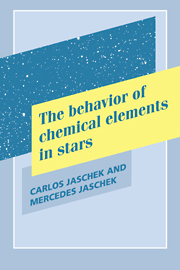Book contents
- Frontmatter
- Contents
- Preface
- Part One Content description
- A Aluminum Al to Arsenic As
- B Barium Ba to Boron B
- C Cadmium Cd to Curium Cm
- D Dysprosium Dy
- E Erbium Er to Europium Eu
- F Fluorine F
- G Gadolinium Gd to Gold Au
- H Hafnium Hf to Hydrogen H
- I Indium In to Iron Fe
- K Krypton Kr
- L Lanthanum La to Lutetium Lu
- M Magnesium Mg to Molybdenum Mo
- N Neodymium Nd to Nitrogen N
- O Osmium Os to Oxygen O
- P Palladium Pd to Promethium Pm
- R Rhenium Re to Ruthenium Ru
- S Samarium Sm to Sulfur S
- T Tantalum Ta to Tungsten W
- U Uranium U
- V Vanadium V
- X Xenon Xe
- Y Ytterbium Yb to Yttrium Y
- Z Zinc Zn to Zirconium Zr
- Summary
- Part Two Content description
- Part Three Content description
- Part Four Content description
- References
- Index of elements in stars
- Index of molecules in stars
U - Uranium U
Published online by Cambridge University Press: 06 July 2010
- Frontmatter
- Contents
- Preface
- Part One Content description
- A Aluminum Al to Arsenic As
- B Barium Ba to Boron B
- C Cadmium Cd to Curium Cm
- D Dysprosium Dy
- E Erbium Er to Europium Eu
- F Fluorine F
- G Gadolinium Gd to Gold Au
- H Hafnium Hf to Hydrogen H
- I Indium In to Iron Fe
- K Krypton Kr
- L Lanthanum La to Lutetium Lu
- M Magnesium Mg to Molybdenum Mo
- N Neodymium Nd to Nitrogen N
- O Osmium Os to Oxygen O
- P Palladium Pd to Promethium Pm
- R Rhenium Re to Ruthenium Ru
- S Samarium Sm to Sulfur S
- T Tantalum Ta to Tungsten W
- U Uranium U
- V Vanadium V
- X Xenon Xe
- Y Ytterbium Yb to Yttrium Y
- Z Zinc Zn to Zirconium Zr
- Summary
- Part Two Content description
- Part Three Content description
- Part Four Content description
- References
- Index of elements in stars
- Index of molecules in stars
Summary
This element was discovered by M. H. Klaproth in Berlin in 1789. Its name alludes to the planet Uranus, discovered by Herschel in 1781, which in turn alludes to the Greek god Urania.
lonization energies
UI 6.1 eV, UII 14.7 eV.
U is the heaviest stable element. It has not been observed in the sun.
Behavior in non-normal stars
UII was discovered independently by Guthrie (1969) and by Jaschek and Malaroda (1970) through the presence of 3859 in Ap stars of the Sr-Cr-Eu subgroup. The two groups each found this line in a different Ap star. It was also observed by Cowley et al (1974) in other stars of this subgroup. Typically W(3859)=0.030.
A detailed study of U and its isotopes was made by Cowley et al. (1977).
Isotopes
The longest lived isotope of U is U238, with a half life of 4.5 x109 years. It is followed by U235 with a half life of 7.0 X108 years and by 13 isotopes and isomers with shorter half lives. In the solar system U238 makes up 99.3% of all U. The isotopes of U can be used for radioactive dating.
Origin
The U isotopes are produced by the actinide-producing r process.
- Type
- Chapter
- Information
- Publisher: Cambridge University PressPrint publication year: 1995



